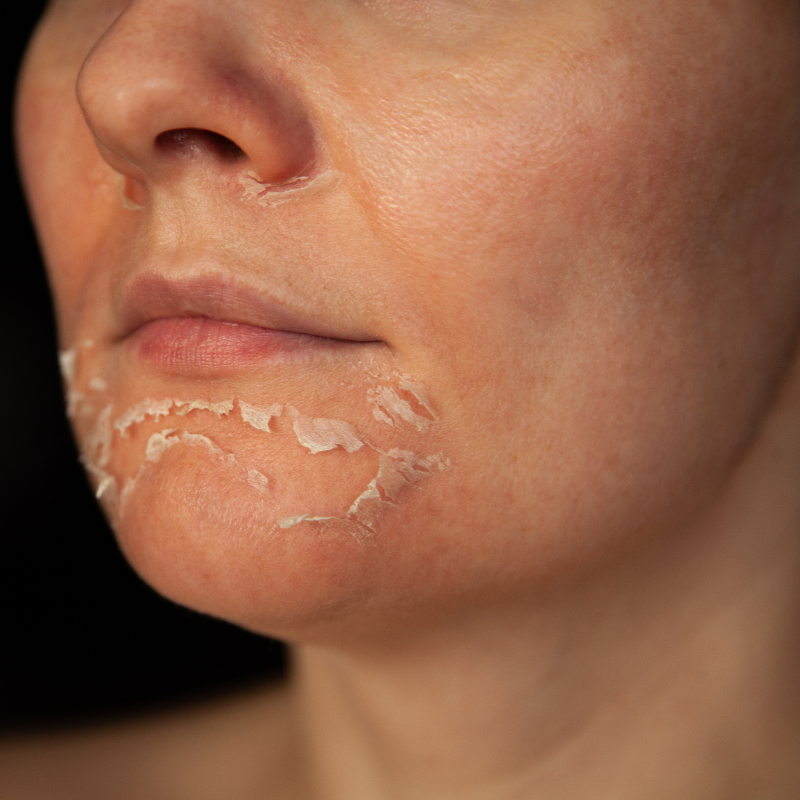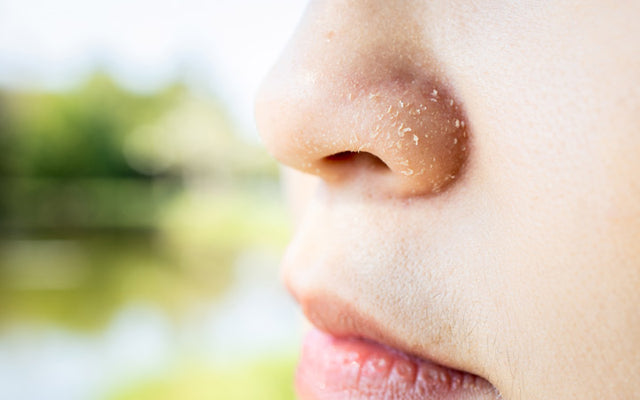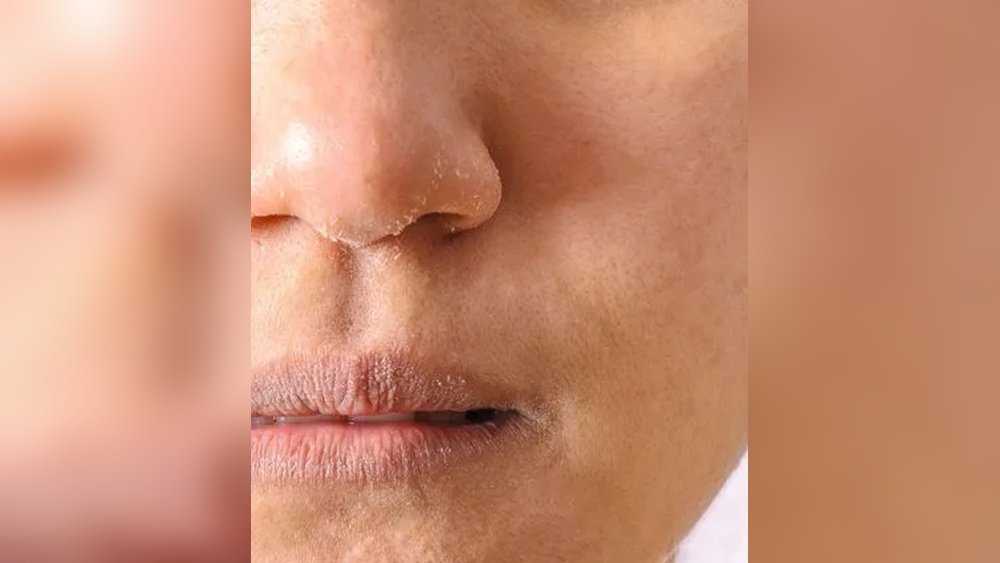Is your nose constantly feeling dry, tight, and flaky no matter what you try? That rough, flaky skin on your nose can be uncomfortable and even embarrassing, making you want to hide your face.
But the good news is, you don’t have to live with it. With the right care and simple changes, you can soothe your skin and restore its smoothness. You’ll discover easy and effective dry flaky nose skin treatment tips that work—from gentle cleansing to powerful moisturizers and smart lifestyle hacks.
Ready to say goodbye to flaky skin and hello to a healthier nose? Keep reading to find out how.
Causes Of Dry Flaky Nose Skin
Dry, flaky skin on the nose can feel uncomfortable and look unsightly. Understanding the causes helps in choosing the right treatment. Several factors can lead to this common skin issue.
Environmental Factors
Cold weather often dries out the skin on the nose. Wind can strip away natural oils that protect the skin. Low humidity, especially indoors, makes the skin lose moisture quickly. These conditions cause dryness and flakiness.
Skin Conditions
Skin problems like eczema and psoriasis can cause flaky patches on the nose. Rosacea may also lead to redness and dry skin in this area. These conditions require special care to soothe irritation and prevent peeling.
Harsh Skincare Products
Using soaps and cleansers with alcohol or strong fragrances can dry out the nose skin. Over-washing or scrubbing too hard removes protective oils. This damages the skin barrier, causing flakes and irritation.
Allergic Reactions
Allergies to skincare products or environmental allergens can trigger dryness and flaking. Contact dermatitis from certain ingredients leads to irritated, flaky skin on the nose. Avoiding triggers is key to healing.
Dehydration And Poor Nutrition
Not drinking enough water affects skin moisture levels. Lack of essential vitamins and fatty acids can weaken the skin’s barrier. This makes the nose skin prone to dryness and flakes.

Credit: www.olivaclinic.com
Choosing The Right Moisturizer
Choosing the right moisturizer is vital for treating dry, flaky nose skin. The skin on the nose is delicate and requires special care. The right moisturizer helps restore moisture, reduce flakiness, and protect the skin barrier. Picking a product with the correct ingredients and texture can make a big difference. Moisturizers that lock in moisture and soothe irritation work best for dry nose skin.
Understanding Moisturizer Ingredients
Look for moisturizers with occlusive ingredients like petrolatum or dimethicone. These create a barrier that seals moisture into the skin. Humectants such as glycerin and hyaluronic acid attract water to the skin. Emollients like ceramides and fatty acids soften and smooth the skin surface. Avoid products with fragrances, alcohol, or harsh chemicals that can irritate dry skin.
Choosing The Right Texture
Heavy creams or ointments are best for dry, flaky skin on the nose. They stay on the skin longer and provide better hydration. Light lotions or gels may not provide enough moisture. Apply moisturizer right after washing your face to trap water in the skin. Consistent use helps repair the skin barrier and reduce flakiness over time.
How To Apply Moisturizer Effectively
Apply moisturizer on slightly damp skin for better absorption. Use gentle motions and avoid rubbing harshly. Focus on the nose area and surrounding dry patches. Reapply moisturizer throughout the day if the skin feels tight or dry. Regular use prevents flare-ups and keeps the skin soft and healthy.
Gentle Cleansing Techniques
Gentle cleansing plays a key role in treating dry, flaky nose skin. Harsh washing strips natural oils and worsens dryness. Using mild techniques helps keep skin soft and hydrated.
Choosing the right method supports skin healing and reduces flakes. Clean skin prepares the nose for better moisture absorption. Simple changes in cleansing can improve skin comfort and appearance.
Use Lukewarm Water For Washing
Hot water removes essential oils from your skin. Lukewarm water cleans without causing dryness or irritation. It feels soothing and protects the skin’s natural barrier.
Choose Gentle, Hydrating Cleansers
Select cleansers without soap, alcohol, or strong fragrances. Hydrating formulas help maintain moisture while cleaning. Avoid products with harsh chemicals that can cause redness or itching.
Pat Skin Dry With A Soft Towel
Rubbing dry skin worsens flakes and causes irritation. Gently pat your nose with a soft towel instead. This technique preserves skin moisture and prevents damage.

Credit: skinkraft.com
Home Remedies For Instant Relief
Dry, flaky skin on the nose can feel uncomfortable and look unpleasant. Simple home remedies provide quick relief. These treatments help soothe irritation and restore moisture fast. Consistent care is key to healing and preventing flakes. Try these easy methods for instant comfort and healthier skin.
Hydrate And Moisturize Regularly
Apply a thick moisturizer to your nose skin twice daily. Use creams with ingredients like petroleum jelly or dimethicone. These form a barrier to lock in moisture. Moisturize right after washing your face to keep skin hydrated longer. Drinking plenty of water also helps keep your skin moist from inside.
Use Gentle Cleansers And Lukewarm Water
Wash your face with lukewarm water to avoid drying skin. Hot water removes natural oils and worsens flakiness. Choose gentle, fragrance-free cleansers that hydrate rather than strip skin. After washing, pat your nose dry with a soft towel instead of rubbing. This reduces irritation and skin damage.
Protect Your Skin From Harsh Weather
Cold wind and dry air make nose skin dry faster. Cover your nose with a scarf in cold or windy weather. Use a humidifier indoors to add moisture to dry air. This prevents your skin from losing natural hydration. Avoid prolonged exposure to harsh elements to keep your skin calm and smooth.
Environmental And Lifestyle Tips
Dry, flaky skin on the nose often worsens due to environmental and lifestyle factors. Simple changes can protect your skin and reduce dryness. These tips help keep your nose soft and healthy every day.
Protect Your Skin From Harsh Weather
Cold air and strong winds dry out skin quickly. Cover your nose with a scarf or face mask outside. This shield blocks cold and wind. In dry weather, avoid long exposure to sun and cold.
Use A Humidifier Indoors
Heating systems and air conditioners remove moisture from the air. Dry air makes nose skin flaky and irritated. A humidifier adds moisture back into the room. This helps keep your skin hydrated and calm.
Drink Plenty Of Water
Water hydrates your body and skin from inside. Dehydration makes skin dry and flaky. Aim to drink enough water daily. This supports healthy skin and reduces dryness around your nose.
Avoid Harsh Cleansers And Hot Water
Strong soaps and hot water strip natural oils from skin. Use gentle, hydrating cleansers instead. Wash with cool or lukewarm water. Pat your skin dry softly with a towel. These steps protect your skin’s natural moisture.
Limit Touching And Picking At Your Nose
Touching or scratching dry skin can worsen flaking and irritation. Keep your hands clean and avoid picking. This helps skin heal faster and stay smooth.

Credit: trexhouston.com
When To Seek Professional Help
Seek professional help if dryness on your nose lasts more than two weeks or worsens despite home care. Persistent flakes, redness, or pain may signal conditions like eczema needing expert treatment. Early advice from a dermatologist ensures proper care and faster relief.
Dry, flaky skin on the nose often improves with home care. Sometimes, the problem lasts or worsens despite treatment. Knowing when to see a doctor can prevent more serious issues.
Persistent dryness, redness, or discomfort may need medical attention. A healthcare professional can identify skin conditions needing special treatment. Early care helps avoid complications and speeds healing.
Persistent Dryness And Flaking
If dryness and flakes last more than two weeks, visit a dermatologist. Continuous symptoms may indicate a deeper skin problem. Professionals can suggest stronger treatments or prescription creams.
Signs Of Infection Or Severe Irritation
Look for swelling, pain, or oozing around your nose. These signs could mean an infection or severe irritation. Immediate medical care can stop the problem from spreading or worsening.
Suspected Skin Conditions
Conditions like eczema, psoriasis, or rosacea can cause flaky nose skin. A doctor can diagnose and recommend the right treatment. Avoid guessing or self-medicating as it may worsen your skin.
Allergic Reactions Or New Products
New skincare products sometimes cause allergic reactions. If your skin becomes red, itchy, or flaky after using a product, stop it. A professional can help identify the allergen and suggest safe alternatives.
Frequently Asked Questions
How Do I Get Rid Of Flaky Skin On My Nose?
Apply a rich, occlusive moisturizer like petroleum jelly on damp skin. Use gentle, hydrating cleansers with lukewarm water. Pat dry gently. Protect skin from cold and dry air with a scarf and use a humidifier indoors. Stay hydrated by drinking water.
Consult a dermatologist if flakes persist.
Why Does The Skin On My Nose Feel Like Sandpaper?
The skin on your nose feels like sandpaper due to dryness and irritation. Lack of moisture, harsh cleansers, or cold weather often cause this texture. Use gentle cleansers, apply rich moisturizers, and protect skin from harsh elements to restore softness and prevent roughness.
Why Is My Nose Super Dry And Crusty?
Your nose feels dry and crusty due to dehydration, harsh weather, or irritation from soaps. Use gentle cleansers and apply heavy moisturizers with occlusive ingredients like petroleum jelly to lock in moisture. Staying hydrated and using a humidifier also help prevent dryness.
Can I Put Vaseline On Dry Skin Around My Nose?
Yes, you can apply Vaseline on dry skin around your nose. It locks in moisture and protects the skin barrier. Use it on clean, damp skin for best results. Avoid applying too much to prevent clogged pores or irritation.
Conclusion
Treating dry, flaky nose skin takes patience and care. Use gentle cleansers and rich moisturizers daily. Protect your skin from cold, wind, and dry air. Drinking water helps keep your skin healthy from inside. Avoid harsh soaps and hot water to prevent irritation.
If dryness lasts or worsens, seek advice from a dermatologist. Consistent care improves skin texture and comfort over time. Small steps make a big difference in skin health. Keep your routine simple and gentle for best results.
 Skip to content
Skip to content 